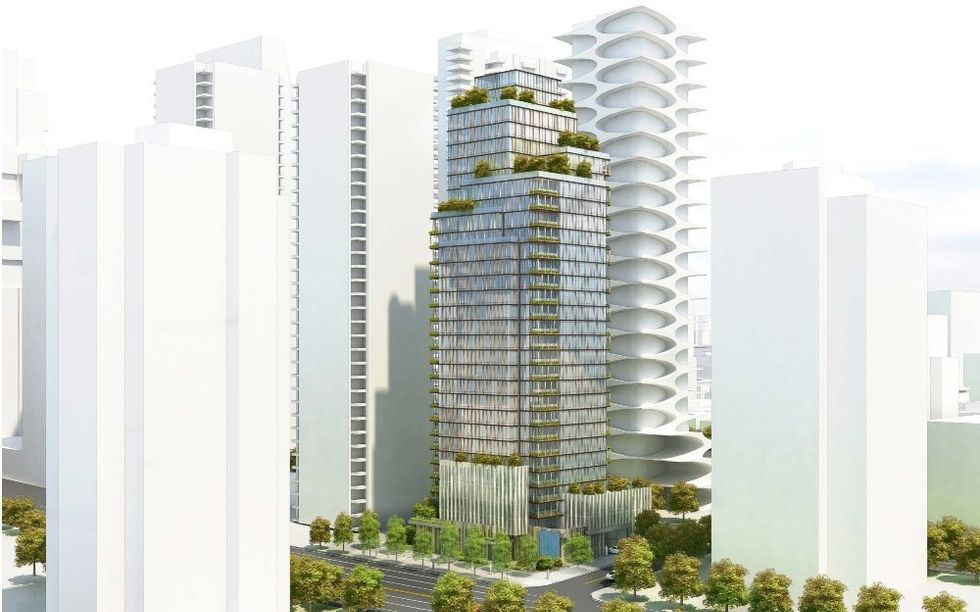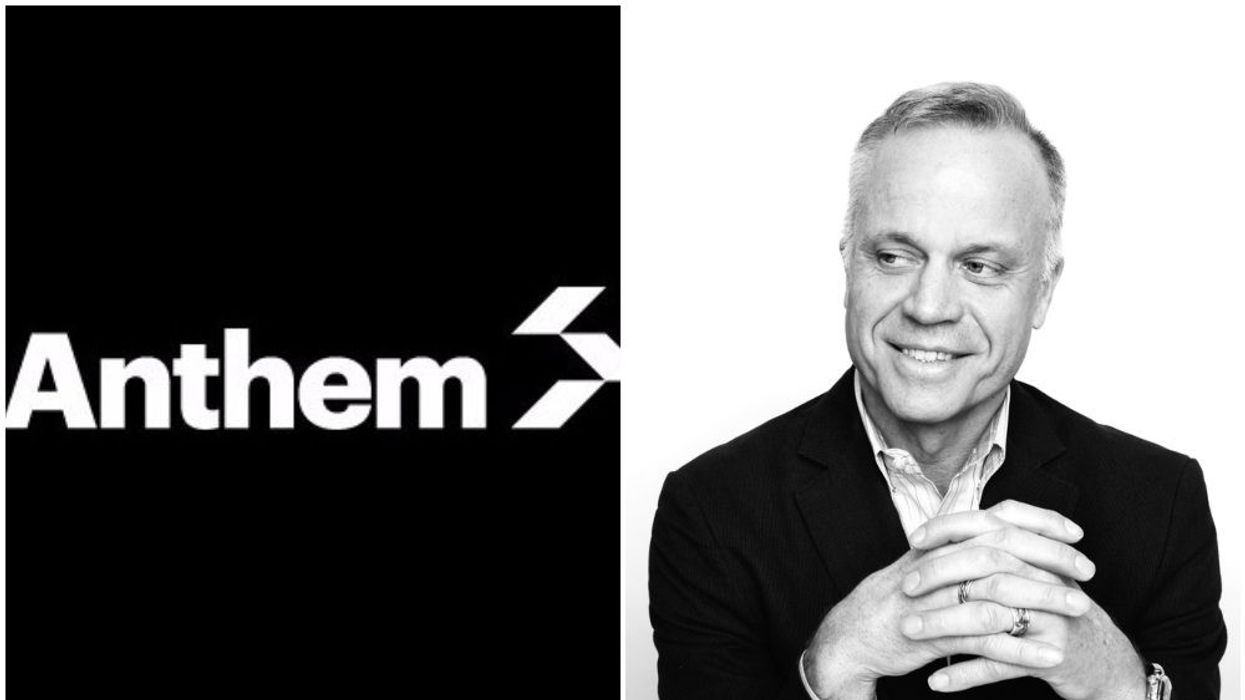On Wednesday, the City of Vancouver published its agenda for the upcoming council meeting on Tuesday, June 13, which included an item that showed that Anthem Properties had requested a deferral on a Community Amenity Contribution (CAC) payment for an upcoming project.
The CAC payment is pertaining to Anthem Properties' project on 1616-1698 W Georgia Street that Anthem has named Park. The proposal is for a 33-storey building that will include 127 strata residential units, and is designed by New York-based firm Kohn Pederson Fox.
Development projects that require rezoning approval are subject to CACs, which can be delivered either as an in-kind physical amenity for the City or a cash contribution. In a report to Council, staff noted that the City and Anthem had agreed on a CAC payment of $26.1M for the Park project, as well as a deferral of a portion of the payment.
As per the City of Vancouver Community Amenity Contributions Policy for Rezonings, cash CACs have to be paid prior to rezoning by-law enactment, but portions of the cash CAC over $20M can potentially be deferred, at the discretion of the City.

When the Park project was approved, the City made an exception and agreed that $15,660,000 (60%) of the $26.1M -- rather than just the portion over $20M -- was to be paid prior to rezoning enactment, but that the remaining $10,440,000 (40%) could be paid either upon issuance of the Stage 1 building permit for the project or the 24 months after the rezoning enactment, whichever is earlier.
Rezoning enactment for this project occurred on April, 26, 2022.
In the report, the City said that Anthem has paid the initial 60%, but is seeking an extension for the remaining 40%, either upon the issuance of the Stage 2 building permit for the project or 24 months after rezoning enactment, whichever is earlier.
Stage 1 building permits are generally issued to allow excavation work on a site, while Stage 2 building permits allow for site works from foundations to grade.

The City notes that there are no proposed changes to the "outside date" and the remaining amount would still be paid by April 25, 2024 at the latest, adding that Anthem is requesting the CAC deferral -- referred to as a "one-off" elsewhere in the report -- "due to market uncertainty from recent interest rate increases, coupled with unprecedented increased in hard costs.
According to the City, the remaining balance is subject to interest accrued beginning from the date of rezoning enactment at prime plus 2%, with interest payable in quarterly installments,
Staff and the City's Risk Management Committee are recommending Council approve Anthem's request, and a decision will be made on Tuesday, June 13.
In an interview with STOREYS, Anthem Properties Founder and CEO Eric Carlson discusses the rationales behind the CAC deferral, why it's a positive for the Park project, and the current state of housing development in Vancouver and Metro Vancouver at large.
Most people would consider Anthem one of the bigger developers in Metro Vancouver and may be surprised by this $10M CAC deferral request, or perhaps even take it as a sign that Anthem is in trouble. Can you elaborate on the reasoning for the extension request?
It's unfortunate that this is kind of the implication in that story in the Vancouver Sun. This project has been around for a long time. We took four and a half years to get to the rezoning. Getting anything done in recent times has been very difficult. There's new rules all the time, new regulations all the time, and it just gets bogged down.
We're very anxious to get going. We want to start excavation this summer, while the weather is good and don't have rain to contend with, and a little less traffic on the streets. But our construction financing won't kick in until the fall, and you have to pay these fees by the time you pick up the building permit, typically. I wanted to get the project going, pay for the construction costs of the project out of, what I'll call, corporate cash, and I just wanted help on getting it going. And the City is considering it because they want to get a bunch of homes built.
So getting the CAC deferral would allow Anthem to start on the project sooner?
Yes. If they don't do this, we wouldn't be able to get going until our construction financing kicks in. The project is in its own little capital fund -- we have partners in it -- and that capital pays for a lot of the fees, and the construction costs, and the interest, and the property tax on the land, but to really get going, we wanted to defer that [CAC] payment by eight or nine months. This project is quite well capitalized. We own the lands and have been carrying it for years. We're sort of the owner-manager. We have partners on it. It's a pretty strong group, and we're motivated to see this thing through and get it done, but we're trying to be prudent and get it done with the resources we have on hand.
This is just about getting the show on the road, as opposed to the project [not working], or we're in trouble, or anything like that. To me, this is just normal business course. Stakeholders on real estate projects make arrangements all the time to create solutions to get things built on time and on budget to achieve mutually-acceptable outcomes.
Compared to the number of homes needed in the region, relative to population growth and household formation, there's a huge deficit, which is why we have a 0% vacancy rate. This council and staff, they want to try to fix that, and this is them trying to get a project that's ready-to-go going, a project that's been significantly delayed because of the slow nature of the approval process.
(The City of Vancouver's Director of Planning Theresa O'Donnell provided the following statement to STOREYS: Back when COVID hit, there were about 6 or 7 high-density downtown projects that stalled out. The City was keen to keep those deals alive and we explored alternatives to our standard CAC policy in an effort to assist the developers. We worked with them to develop a 2-year time-limited option. One aspect of that option was to defer payment of these large CACs. Only 3 of the 7 opted for the deferral, Anthem was one of them.)
The City wanted to get fees. If we start construction, they'll get them; if we don't, they won't. So if they give us a little bit of a helping hand here, they'll get more money later [from interest]. We already paid $16M. In the meantime, they get all the connection fees, offsite fees, engineering fees, building permit fees. It's kind of a win-win. And more importantly, for the market, we get more housing in the system sooner. Housing of any kind is good for the market right now. It takes the pressure off of other parts of the market, frees up stock as people move.
For Anthem, this just means we get our project moving several months sooner, rather than waiting even longer than we've already waited. It allows us to start sooner. It'll get us digging the hole in the summer, it'll speed up the completion time by -- probably -- five or sixth months.
What "new rules" are you alluding to that bogs things down?
We're building houses half as fast as we're capable of building them, because we're so bogged down with all the new rules. There's so many new rules, new fees. We're trying to solve a lot of problems, for the world, for the community as a whole, whether you're a politician, staff member, developer, or concerned citizen. Decarbonized buildings, climate change, affordability, [making] sure buildings are safe, but the end result of that is the building code gets longer every year, it gets more expensive to build a home every year, the fees go higher -- as a percentage of the total -- every year.
It used to be you pay one or two permit fees, now there's like 20 of them -- the big one being the CAC. The Province has introduced four or five levels of new taxation on housing units since 2018. The federal government is getting in on the action. Metro Vancouver [the federation], they're now starting to charge fees. It just keeps getting layered on more and more.
How does this compare across municipalities, such as Burnaby, where Anthem has numerous projects?
It really depends on what year you're talking about. The list of 10 municipalities that was announced last week [to be given housing targets by the Province], I think that kind of pressure speeds cities up. I will say that we've had better success in places like Coquitlam and Burnaby than we have in places like the City of Vancouver or the District of North Vancouver, or Port Moody for that matter.
But councils have changed in some of those cities, and attitudes have changed. I also think public knowledge and awareness of what the issues really are is increasing and so I'm finding that the City of Vancouver is getting quite a bit better, quite a bit faster right now.
Burnaby -- even though it's been great over the years -- had two years where it was terrible because they stopped processing applications until they figured out what their affordable housing policy was. They got that done and now they're back on track.
When you have pressures like we have with our housing problems, people do the best they can with what they know, and things can get bogged down. Collectively, as a region, I think we got quite bogged down in recent years. I think that some of the councils and municipalities have gotten worse, not better -- not always because they were malicious, but because they just have different views of how things work, and I think that some of those views are misplaced.
Are there any positives?
What I've seen now is the beginning of a reversal. The focus is now "let's just build homes." We're seeing City staff say "what can we do to help get this thing going?" And provincially, even. After four years of demand management constipation from the provincial government, blaming foreigners, money launderers, gangsters, and rich people for the housing crisis, they finally realized it's because they weren't building homes fast enough.
We finally have a coming together of stakeholders, of city governments, of city staff, and developers doing things to accelerate projects, to get housing supply back on track, but we're in the beginning stages and it's gonna take a while. But there's a change in attitude.
Can we make building housing a top priority? Can we make regulating housing a top priority? I think we're moving in that direction.
Responses have been edited for length and clarity. This article has also been updated with a statement from the City of Vancouver.
- Anthem Properties Acquires Calgary-Based Cedarglen Homes ›
- CEO Christine Bergeron On Joining Concert Properties, State Of The Industry ›
- Developers Voice "Deep Concern" Over Burnaby's New ACCs ›
- Four Vancouver High-Rise Projects To Be Delayed Due To Weak Strata Market ›
- Anthem Properties Founder Eric Carlson Talks Roadblocks In Homebuilding ›





















